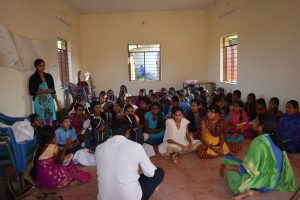
Cultural vehicles often become a way to perpetuate the subjugation of women. Sayings, proverbs and other platitudes internalize gender roles and stereotypes, couching toxic ideas in seemingly benign rhetorical devices. For example, a study on African cultures establishes how proverbs can create a discourse in which women and young girls are portrayed in stereotypical gender roles, and how their use in everyday parlance has been a deterrent to gender-sensitization efforts in the continent.
As a way of unpacking gendered messaging in language, the Prakriye team conducted an activity with the kishoris where old Kannada sayings and proverbs were brought up for discussion. The kishoris we interacted with during our trainings felt that commonly used Kannada proverbs insult women in sharp and subtle ways. For instance, there is oft-quoted proverb – ‘Yeradu jade seridare jagala’, which means that where there are two braids, a fight is inevitable (alluding to the idea that women can’t co-exist amicably with one another).
In unpacking the saying, the kishoris were able to articulate how infighting amongst women fight was not different from infighting amongst men, but women get noticed because they are expected to behave in a particular manner. They also felt that women felt insecure when they move to a new house after marriage and the change of environment causes frustration, ultimately leading to conflict. However, they recognize men fighting in the panchayat, bar, bus stand or hotel, as an expression of masculinity.
Another commonly used proverb that came up in the discussion was ‘Tayiyanthe magalu nulinanthe sire’, which means that daughters are replicas of their mothers. The kishoris talked about how even positive proverbs could be twisted to undermine women or attribute unreal expectations to them. In this instance, the male members hold the women responsible for traits and behaviors of their children, whether good or bad. The Prakriye team made an effort to convince the kishoris that children can inherit traits from both mother and father, the kishoris then did an exercise to see what traits of theirs belonged to which parent and found for themselves that the use of the proverb in question, in this particular manner must be challenged.
Through this activity, kishoris got an opportunity to recollect and rethink ways in which gender is internalized in language, and gained a better understanding of the implicit ways in which language can be used to undermine women.